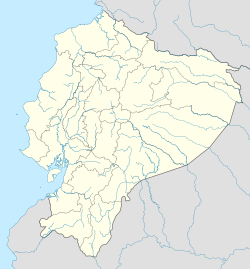Otavalo (city)
| Otavalo | |
|---|---|
| Town and ethnic group | |
| Coordinates: 0°13′49″S 78°15′45″W / 0.23028°S 78.26250°WCoordinates: 0°13′49″S 78°15′45″W / 0.23028°S 78.26250°W | |
| Climate | Cfb |
Otavalo, capital of Otavalo Canton, has a population largely made up of the Otavalo indigenous group. It is located in Imbabura Province of Ecuador. According to the 2010 census, the town has 39,354 inhabitants and has an elevation of 2,532 metres (8,307 ft). It is surrounded by the peaks of Imbabura (4,630 metres (15,190 ft)), Cotacachi (4,995 metres (16,388 ft)), and Mojanda volcanoes. Gustavo Pareja is the current mayor of Otavalo. He was elected in February 2014.
The indigenous Otavalo people are famous for weaving textiles, usually made of wool, which are sold at the famous Saturday market. Although the largest market is on Saturday, there is a very wide range of wares available throughout the week in the Plaza de los Ponchos, and the many local shops. The shops sell textiles such as handmade blankets, tablecloths, and much more.
The Otavalo market consists of mushroom-shaped concrete umbrellas with benches. The market was designed and built in 1970 by Dutch architect Tonny Zwollo.
During the market's peak, almost one third of the town becomes full of stalls selling textiles, tagua nut jewelry, musical instruments, dream catchers, leather goods, fake shrunken heads, indigenous costumes, hand-painted platters and trays, purses, clothing, spices, raw foods and spools of wool. As the city has become more of a tourist attraction, many of the goods sold in the markets are mass-produced in nearby factories and sold in the market by middle-men. More artisan products can be purchased in neighboring communities or at the Museo Viviente Otavalango.
Otavalo was an area made up principally of farming communities due to the rich volcanic soils in this area, but with the growth of tourism, the town has begun to focus more on the making of handicrafts which have made the Saturday market a popular stop with visitors to Ecuador. Tourism has become the town's main industry and as a result there are many more hotels, hostels, and tour operators than other similarly sized Ecuadorian towns, such as nearby Cayambe. Further, Otavaleño (people from Otavalo) have had notable success selling their goods abroad.
...
Wikipedia

